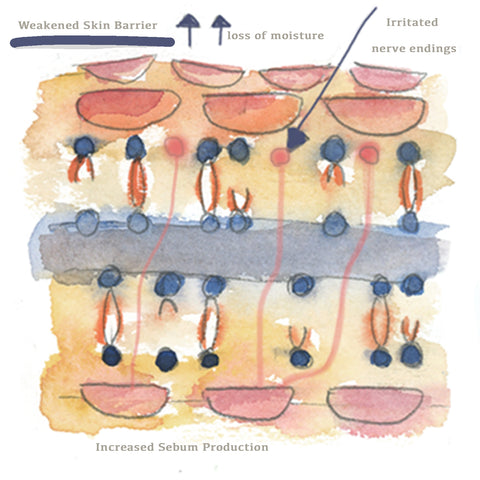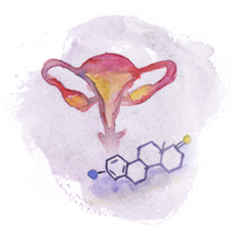Sensitive Skin? How Hormones Are Affecting Your Skin Barrier Function

Hormones have long-term effects on the overall health of your skin. Understanding the changes your hormones go through, and the visible effects they have on your skin’s barrier function will help you to better understand how to properly care for your skin and overall health.
Think of the skin barrier as your car windshield, protecting you from the damage of harsh winds, debris, and an occasional cigarette butt. The skin barrier stands between you and environmental chemicals, free radicals, bacteria, toxins, damaging UV rays, and other external aggressors. So the key to healthy skin lies in a strong skin barrier, which sensitive skin may lack.
Signs of Sensitive Skin

Redness, Breakouts, Dullness, Dryness, Flushes
When hormones shift, skin barrier function is compromised, and skin becomes more sensitive and prone to sun damage, redness, breakouts, flushes, aging, and dryness. The term "skin barrier" refers to the outermost layer of the skin, which is responsible for keeping moisture in and damaging elements (like UV and free radicals) out.

HOW DOES MONTHLY CYCLE AFFECT
SKIN BARRIER FUNCTION

Your skin has thousands of Sebaceous Glands covering its surface. These tiny glands are responsible for producing Sebum, the waxy/oily substance that is both an enemy and a friend, depending on your hormone health.
With the production of androgens such as testosterone, sebaceous glands are more active, resulting in more sebum production that potentially weakens skin barrier function, irritates nerve endings in skin barrier and causes skin sensitivity such as redness and breakouts.
Estrogen and other female sex hormones tend to drop significantly just before menstruation, which is when PMS symptoms begin to show, and signs of skin sensitivity do too.
Yeah, no fun.
HOW DOES LIFE CYCLE AFFECT
SKIN BARRIER FUNCTION

Hormones tend to shift once again during/after pregnancy and during/after menopause, which affect skin’s sebum production, and barrier function once again.
If you’ve ever heard of or experienced a “pregnancy glow”, which post-partum, skin appeared duller or broken-out, you may start to understand the connection between your hormones and skin health. During pregnancy, you are producing higher levels of estrogen and progesterone, which dip back down significantly post-partum.
Stressed, Sensitive Skin? Shop our CLARIFYING /HEALING Collection, featuring Plant-Based skincare Custom Crafted for Soothing Skin Sensitivity.
 Skip to content
Skip to content